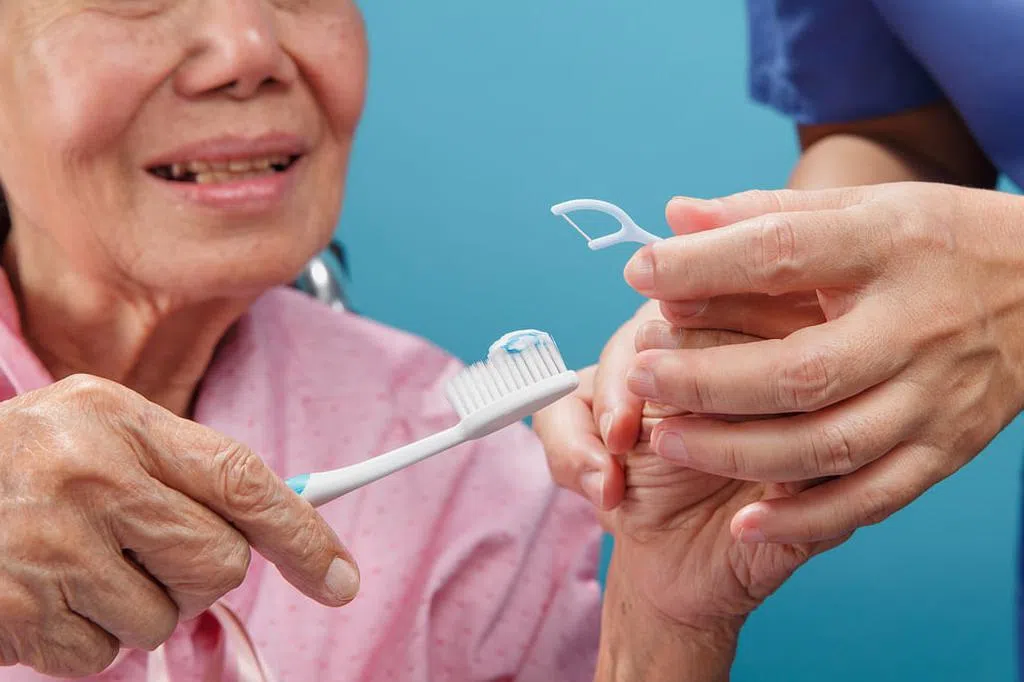Oral health is often overlooked in dementia care, but experts warn that oral problems can seriously impact a patient's nutrition, health, and quality of life. In an interview, dentists shared common oral health issues faced by dementia patients, care techniques, and how dentists can help patients navigate their appointments more smoothly.
Dental Consultant Dr. Chan Wan Yung of Ng Teng Fong General Hospital told Lianhe Zaobao that dementia patients often experience poor oral hygiene, plaque buildup, tooth decay, periodontal disease, and gingivitis caused by dentures. These problems often worsen as the disease progresses. Dr. Chen Wanrong explains, "In the early stages, patients may simply forget whether they've brushed their teeth. As the condition worsens, they gradually lose track of the brushing steps, and once-simple movements become complex and difficult to perform. In the later stages, patients are often unable to maintain oral hygiene independently and rely on caregivers for assistance. They may even resist caregivers who perform oral hygiene out of fear or a sense of threat."
If patients resist oral hygiene, caregivers can try incorporating toothbrushing into a regular routine. "If brushing morning and evening isn't feasible, consider brushing when the patient is most relaxed. For example, in the shower or in front of the TV, patients may be more willing to comply. Ideally, brushing should be done twice a day or after meals. However, if compliance is low, brushing once a day is a second-best option. This helps remove food particles and plaque, reducing bacterial load."

确保假牙正常发挥功能
陈婉榕医生建议,在与失智症患者互动时,照护者应从正面接近患者,以减轻威胁感,“并用简短的步骤解释要做的事,边做边给予肯定与鼓励。避免用‘不要’否定患者,以免增加抵触情绪。”
陈医生强调, 口腔问题往往不易被发现,也常在日常照护中被忽略。然而,口腔健康是整体健康的重要组成部分,它能直接或间接影响个人的营养摄入、吞咽、整体健康与身心福祉。若口腔疼痛,失智症患者可能会拒绝进食,进而导致营养不良与脱水。口腔卫生差且牙菌斑过多时,再加上失智症相关的吞咽问题,就可能增加吸入性肺炎的风险。不合适的假牙也会影响咀嚼功能与舒适度,进而影响饮食类型、营养与健康。
延伸阅读

陈医生说:“因此,不论是否还有牙齿,失智症患者都应该继续接受定期牙科检查,以确保口腔健康、无疾病或疼痛,且假牙正常发挥功能。”
重视失智者及照护者意见
牙科就诊对失智症患者及家庭来说,可能是一项不小的挑战。牙医可以做些什么,让就诊过程更顺利、压力更小呢?
陈婉榕医生认为,并非所有失智症患者都会抗拒牙科检查,尤其是那些在确诊前已有定期看牙习惯的人。牙医通常会与家属沟通,了解患者的病情、依赖程度以及口腔护理目标,同时会与患者本人交流,尊重其意愿和需求。“应了解患者在口腔健康与护理目标上的关注点。在制定治疗计划与健康目标时,同时纳入失智者及其照护者的意见,而不是忽略患者,仅与家属对话。”
为了增加配合度,牙医会以亲切态度建立信任,放慢语速,简化治疗步骤,并给予正向肯定。“照护者的陪伴也很重要,不仅能安抚患者情绪,还能提供宝贵的信息,协助制定更贴合患者需求的护理方案。若患者一时不愿配合,牙医也可安排在另一天或患者心情较佳的时段再尝试。”
留意口腔疾病的信号
陈婉榕医生提醒,照护者在日常照护中应留意以下迹象:
口腔肿胀、疼痛
出血或有脓液
龋齿、牙齿变色
牙齿松动
出现白斑或红斑
陈医生说:“若患者无法表达不适,照护者可观察是否在刷牙时出现抗拒反应,可能因疼痛而产生防御行为、吐出食物、拒食,或在口腔护理和喂食时,推开或抗拒照护者。这些表现可能都是口腔疾病的信号。最理想的方式是,让失智症患者建立定期牙科检查的习惯,检查频率依口腔疾病风险而定,通常为每3至6个月一次。”
陈婉榕医生总结道,对于失智症患者,良好的口腔护理需要患者、家属与牙科团队的共同努力,才能让他们活得更舒适、更有尊严。陈医生将在黄廷方综合医院与裕廊社区医院联办的线上英语免费讲座分享更多讯息。
▲每月照护者讲座: 关爱失智者的口腔健康Monthly Caregiver Talk: Oral health care for persons living with dementia 日期:10月25日(星期六)时间:上午11时至中午12时报名:for.sg/caregiver
千帆过尽才发现,壮龄正美丽。关注壮龄go! 特制内容,加入壮龄go! 社群,一起过好人生下半场。



